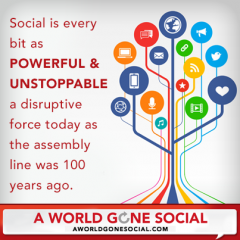 Guest Post by Ted Coiné, Co-author A World Gone Social
Guest Post by Ted Coiné, Co-author A World Gone Social
What used to seem very good leadership practices in the Industrial Age was good, or at least efficient. But the Industrial Age is over. And it’s not coming back. It’s the Social Age now, and it will be for quite some time to come.
New age, New rules.
We humans are social down to our very core – it’s not just what we do, it’s what we are. Connecting with each other, sharing ideas, news, tips – and sometimes warnings – that’s all we’ve ever done. First our connecting was limited to the physical proximity of our tribe or village. Then letters tied us one by one over distances, then phone lines did; then email and texting. But it was limited in scope, just one person connecting with one other, or maybe numerous others, but certainly not with everyone all at once.
Now 2 billion of us are plugged in, and more are coming online every day. Now the entire globe is smartening its phones and carrying the entire Web around in its front right pockets. Now everyone, the whole world, is just a thumb-press or two away.
Remember the idea of six degrees of separation? Six degrees is literally down to one or two now. Through social, you – your customers, your employees, your vendors, your government regulators, and even your competitors – are all just one or two social connections from each other.
And they’re all talking to each other, with or without you.
- This is driving many PR professionals nuts, because nobody will listen to them when they stray too far from the truth.
- It’s inspiring some corporate recruiters to pull their hair out, if they happen to represent less-than-desirable employers, because current and past employees are speaking to each other and to potential workmates.
- Within our organizations, too, this unfettered connecting is what’s killing our corporate leaders’ beliefs that “knowledge is power, and so it must be regulated carefully.” When everyone has knowledge, where does power even come from anymore?
What does this mean for your leadership?
You’re either going to love leading in the Social Age, or you’ll hate it, depending on your outlook. Regardless, none of us gets a vote on these three changes to how we lead at work:
1. In the Social Age, transparency rules.
Peel back this grossly-overused buzzword and explore what transparency really means to you and your company. It means there’s no hiding – lies are either ignored or plastered all over the Internet.
Companies that are led ethically have a huge advantage.
2. In the Social Age, empowerment isn’t an option.
The trick to employee empowerment is who is doing the empowering. Too often leaders talk about giving more power to employees.
In the Social Age, employees are empowering themselves. Wise leaders delight in this, and facilitate it.
3. In the Social Age, it’s all about trust.
Like empowerment, most leaders get this exactly wrong. The trust imperative isn’t about getting others to trust you as a leader: it’s all about trusting your people to show up at work like the mature, responsible adults you hired them to be.
This means tearing up rulebooks, discarding policy manuals, and backing off the stifling metrics Industrial Age management used to make sure no one was stepping out of line.
In the Social Age, there is no line to step out of. In this economy, only the inventive will survive – and only trusted employees have the room they need to invent your future.
Note from Jesse: I am delighted to host this guest post by Ted Coiné, which highlights one of the messages in his highly acclaimed new book, with co-author Mark Babbitt, A World Gone Social: How Companies Must Adapt to Survive. – THE guidebook for how to thrive in the Social Age.
 You’ll discover what it means to create an “OPEN” network of partners, collaborators—even competitors. You’ll learn why nimble and collaborative organizations will ultimately outlive companies unwilling to change. And you’ll find the tools you need to build a strong, socially enabled team.
You’ll discover what it means to create an “OPEN” network of partners, collaborators—even competitors. You’ll learn why nimble and collaborative organizations will ultimately outlive companies unwilling to change. And you’ll find the tools you need to build a strong, socially enabled team.
I love this book! Relevant, practical, easy to read, and packed with analysis of real-world scenarios and indispensable guidance. I was so fascinated I couldn’t put it down, and I predict you won’t either!

Ted Coiné is co-founder of Switch and Shift, a leadership community that believes organizations – in order to thrive in the Social Age – must build trust-based relationships, lead with purpose, and enable employees to do work that matters. A noted blogger and speaker, Ted was recently named a Forbes Top 10 Social Media Power Influencer. Connect with Ted on Facebook (Switch & Shift), Twitter, LinkedIn, Google+













Hi Ted,
Thanks for your excellent article. I shared it with my team today and it started a great discussion about empowerment. I had a huge ah-ha. They don’t want me to empower them. They want me to get out of the way and let them do their job. And I’m left wondering what I’m supposed to be doing with my time. Much to think about. I’ve ordered your book and am looking forward to reading it.
Thank you Chris – this question is so important for leaders/managers of all level. When it’s the business owner asking it, that’s entrepreneurial gold! I call this “boss in a coma” (dark, I know, so if you prefer, call it “boss on an extended vacation.”) Boss in a coma works like this: every business owner should aim for the goal of a self-sufficient business, one that won’t miss him when he’s gone. Then is when you truly know you’ve stood your company up on its own two feet, and it isn’t just you with assistance, but an actual business with longevity: the type you can sell, give to your kids, or grow in a purposeful way.
That last part is the trick, at least for me as a serial entrepreneur, and it’s also where managers at all level can join the discussion. Now that your team is self-sufficient and just wants you to get out of the way, you’re free to invent. What else can your company do for its customers, current or future? Or what other projects can your team take on?
A leader’s role – in a healthy organization, anyway – is to support his or her stakeholders in whatever way they need to best do their jobs. Good people want to work hard, they want to accomplish a common goal by utilizing their talents, and they want to be trusted to do those things without a lot of hovering and interruptions by those who are supposed to be serving them (their “leaders.”) Sounds like that is EXACTLY where you are right now. Bravo! Please, tell me how you progress with this newfound freedom!
Great post Ted. I think the transparency one leaves many exposed, particularly in big corporates. With less room to hide, it is making those who were historically weak at decision making to feel even more vulnerable. Sadly, that only further slows down the decision making process as those people fear the feel of a “glass bowl”
Thank you Thabo. You said a very important word in there which is certainly at the bottom of the entire “slow to act” problem many large organizations have: Fear. A bureaucracy is designed to make careful, deliberate decisions. That is really good if the alternative is the bet the farm, to go all-in and either succeed or go out of business. It’s really, really bad for how business operates today. Take small, survivable risks, but take them with a sense of urgency! He who hesitates has lost. Companies must act as quickly as startups, or they’ll find themselves replaced by one in no time.
A culture of fear is a leadership issue. If executives and midlevel managers are having trouble making decisions because they’re afraid… well, as the saying goes, “the fish stinks from the head.” Maybe the board should start looking for a new head for their organization, one who is less inclined to make those under her feel fearful.
Spot on Ted! Transparency is one of the building blocks to genuine connection with the social world. I noticed that in my own interactions as well. While I might initially be drawn to specific topics/groups/messages/organizations/businesses etc on Social Media, transparency and genuine connections provide the glue…the staying power in those connections.
Thank you Jesse for hosting the guest post!
Thank you Samantha – I could’t have said it better myself! Social media minus social connections is just… media. We already have plenty of that. We humans need each other. I’ll buy a magazine (pre-social media) if I want some quiet time to myself, right?
Dear Ted…enjoyed your summarisation as guest on Jesse’s Blog. Empowerment for me translates to ACCOUNTABILTY. When everyone takes this on personally…what a future their company, their community and they themselves have.
I love it, Raymond. It’s true. In the book we talk about a lot of really successful companies, many of which operate by self-management. The key to self-management, interchangeable with the term flat, is for companies to employ only mature, responsible adults – and then treat them as such. When either side of that equation is off (either immature and irresponsible, childish employees or companies that treat their employees as such), a company is in for a whole ton of trouble. As well, culture will be toxic, and both workers and managers will learn to dislike their work.
I’m always wary of the word “accountability,” as many leaders use it to mean, “do your job, children.” Again, it’s all about mature responsible adults who are treated as such.
Thanks for adding to the discussion!
I loved this book. I teach an MBA class with includes a lot of social media communication. I shared highlights with the class this week.
Karin, thank you SO MUCH!! Coming from an author whose work I love, that makes me feel great. And the fact that the Social Age message is making it into b-school.. awesome.
For this alone –Companies that are led ethically have a huge advantage– a great read! This is, in a nutshell, the promise of the social age; that in an era of newfound transparencies, we can re-incentivize organizations at all levels and in all sectors to essentially behave themselves, and not because it’s explicitly profitable to do so (though that is of course a hoped-for benefit!), but because it’s the right thing to do.
Thanks for this, a pleasure to share …
Regards,
Christopher Watkins
Social Media Manager
fisher VISTA / HRmarketer
Well said, Christopher. The nice thing about this age of everything in the open forevermore, and everyone so easily connected to anyone and everyone else, is that good companies – truly good ones, not just “PR spin good” ones – get to enjoy a massive boost to their prosperity. In the Social Age, to do good, and to be good, is to do well.
Great overview. Agree with much of what you summerized here … but I think it there needs to be much discussion about doing away with policy and depending on trust alone to govern. Innovation, no matter how economically fruitful still must be held accountable to certain standards. I agree with the premise though. Mature, responsibile adults need as much freedom as possible to be creative and to benefit from the new found social awareness and information open to them.
Thanks Frank. I’m with you: no one likes going to work with no earthly idea of what is expected of them. The flat/self-managed companies we’ve studied all have great ways of handling this. These vary widely by company, but they all get the job done quite well. Probably the clearest (without being rigid) is Morning Star’s CLU (Colleague Letter of Understanding), made by the worker in consultation with their teammates, which spells out exactly what they are expected to do, and thus how their peers will evaluate their performance for considerations of pay, added responsibility for the following year, etc. Whether it’s set out clearly like the CLU or more real-time, as at Valve, the idea of hiring mature, responsible adults is that self-management means they’re all managers, not directionless.
excellent points to keep in mind. I know that when I have a bad experience with a business I turn to Twitter and other social media to voice my complaints. Rarely has a company blatantly ignored my irritation, but when they do I am much louder.
Scott, Over the last 6 years I’ve seen some companies out-and-out ignore me, and others jump to fix any problem. It really depends on the customer service ethic of the company on a case-by-case basis, enabled or compounded by their social presence.
Needless to say, I shout the good stories from the rooftops, and I’m not always that shy about sharing the other stories, too.
T